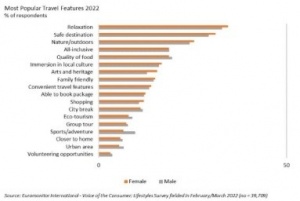Euromonitor International: 10 questions for Caroline Bremner

Euromonitor is the world’s leading provider of strategic market research reporting. Caroline Bremner is Senior Industry Manager at Euromonitor International, and a guest speaker at this year’s ITB Berlin Convention
What is the state of play for travel and tourism?
Euromonitor International’s latest Travel Forecast Model results for Q1 2022 show that international tourism spending is expected to recover to 85% of its 2019 levels in 2023, amounting to USD1.5 trillion. Growth is expected to moderate but still be strong at 37% in 2023, compared to the exceptional growth of 107% enjoyed in 2022, thanks to the rolling back of travel restrictions coupled with strong pent-up demand.
Which regions are recovering faster?
So far, the regions of North America, Western Europe and the Middle East and Africa have led recovery in inbound tourism spending, with the latter being the first region to return to 2019 levels in 2022.
Recovery is slated for 2024 for the majority of regions (Europe, Americas, Australasia) with Asia Pacific lagging behind, not expected to return to peak levels until 2026, in a baseline scenario. However, the recent reopening of China following the removal of its zero-COVID policy will provide a welcome boost.
ADVERTISEMENT
What are the current challenges faced by travel businesses?
The cost-of-living crisis that has engulfed the advanced and developing regions continues to take its toll on consumers’ discretionary income, however, for now pent-up demand remains strong, and global inflation is expected to have peaked in 2022, although remains high at 6.5% in 2023. Travel businesses are also feeling the impact of higher prices for food, drinks, energy, fuel and labour, along with rising interest rates making it more challenging financially. Other challenges facing the sector include labour relations and labour shortages post-pandemic.
Which sectors are the most resilient to the economic headwinds?
Globally, the fastest growth for in-destination spending are spas and medical tourism, as consumer wellbeing post-pandemic is expected to remain a top priority, both growing at 11% CAGR over 2023-2027. Whilst duty-free (9%), national parks (8%) and food & dining (7%) are also expected to grow above average per year, as travellers seek out real world experiences.
What are the top trends for 2023?
Our top three trends for 2023 are the opportunities and challenges now that the travel sector is dealing with a cost-of-living crisis, but also set to benefit from the reopening of China and ramping up of Chinese outbound travel.
We are also seeing a shift in terms of the fastest growing sector for packages, moving more to values-led and interests-based tourism such as wellness, sports and adventure. Ongoing sustainable and digital transformation remains a key trend as the sector continues on the journey to net zero emissions by 2050.
Where are there growth opportunities?
The fastest growing travel categories are airlines’ ancillary revenues where consumers are charged for add-ons such as extra legroom or baggage, growing at 12% CAGR 2023-2027, whilst spas and medical tourism are set to increase by 11% each on average over the same period.
Seeing as two thirds of consumers globally care about climate change and want to have a positive impact on the environment, innovating and creating sustainable products and services is a key growth area to explore and future-proof businesses.
Which consumer segments should destinations be focusing on?
Blended travellers are of increasing interest to destinations around the world from Cape Town, Buenos Aires, the Caribbean to Busan. These travelers include the traditional leisure add-on to a business trip, along with workations, corporate retreats and employees taking advantage of work from anywhere policies. The blended travel market is forecast to be worth USD350 billion by 2027 according to Euromonitor International.
What are the opportunities for travel brands and destinations in the metaverse?
Although the metaverse as a concept is still nascent, we are already seeing travel brands and destinations following fashion brands into the metaverse to create immersive virtual experiences for consumers to enjoy. Areas as diverse as marketing, advertising, loyalty and payments are all due for a metaverse shake-up over the coming years.
Cities like Seoul have launched their own metaverse platform for residents and visitors, whilst Helsinki has crafted a digital twin over the past few decades and continues to leverage the latest 3D mapping combined with computer gaming capabilities to drive operational efficiencies to meet net zero targets.
Will business travel ever recover?
Business tourism spending is set to recover to its pre-crisis 2019 levels by 2024, in line with leisure tourism spending. Post-pandemic, hybrid working practices will continue to dampen the rebound for business travel as virtual conferencing continues to eat share. However, the transformation of the traditional business trip into bleisure trips will enable more blended trips to take place.
The MICE sector is expected to pivot to 3D virtual worlds as seen in the metaverse for business meetings. This would amount to 274 million business trips lost by 2027 and potentially USD36 billion of in-person business travel spending transitioned to virtual business travel activities in the metaverse.
Who will be the traveller of the future?
As we move into the next few decades, the babyboomers will eventually be replaced by younger generations such as Alpha, who are gaming and metaverse natives. In 2030, there is forecast to be 2 billion Generation Alphas. This cohort will grow up with the climate emergency being a daily reality, and will demand greater actions by governments, destinations and travel brands to ensure a just and sustainable transition to a net zero world.
For more Information do not miss the presentations from Euromonitor International about the significant developments in travel industry on 7th and 8th of March at ITB Berlin 2023.

